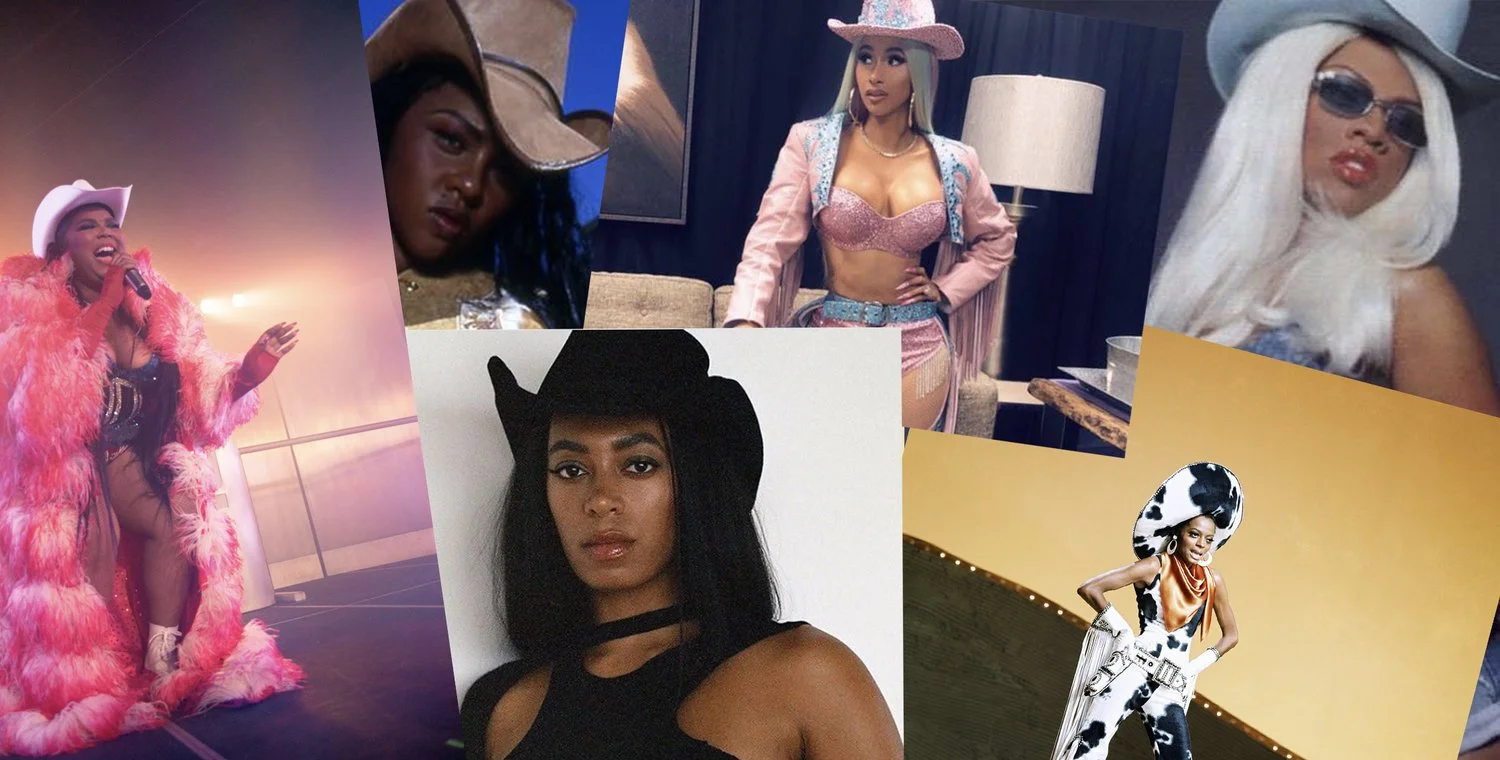What the Yeehaw Agenda Does for Queer Black People
Social media spheres across the Internet have been hit with a cowboy craze over the past several months. Thanks to the introduction of musicians like Lil Nas X, Solange, and Kacey Musgraves, more people are embracing their love of country music. There is even a heightened inclusivity of non-white fans in response to the genre’s emerging diversity. Black country singers have made their stamp on the industry with the production of their dance-worthy bops and Western-chic garb. Photos of celebs like Rihanna and Mariah Carey in their timeless countrified looks have begun to resurface. Cardi B donned a sickening cowgirl get-up in the “Thotiana” remix video. And how could anyone forget Beyoncé’s iconic production of “Lemonade,” which was peppered with representative imagery of her Alabamian and New Orleanian roots? Now more than ever, Black artists are getting the recognition they deserve. They are elevating the essence of the genre through their lyrical prowess and fashion-forward ensembles, one pair of fringe chaps at a time.
Though country music and cowboy life has been viewed as a “White” thing, fans of all races are relishing in the newfound success of their favorite Black performers. This John Wayne mythology, that seems to only recognize the more melanin-challenged listeners of the genre, has been reclaimed by Black musicians from Mary J. Blige to Lizzo. Celebs are sporting their denim jeans and cowboy hats in celebration of the Internet’s favorite theme right now: the Yeehaw Agenda.
Coined by Twitter user Bri Malandro, the Yeehaw Agenda raises awareness of Black country life through a communal celebration of queer excellence. The rural aesthetic that has been surprisingly embraced by millions on Instagram and Twitter has helped to diversify the image of what it means to be a country music fan. Of course, there exists the more noteworthy examples of country-fied pop culture like Lady Gaga’s “Joanne” and Beyoncé’s “Daddy Lessons.” However, underground artists and overnight sensations are the ones helping to give voice to underrepresented rustic queers.
The meme song heard around the world, “Old Town Road,” two-stepped onto the scene in a rush of meme-ery and excitement. With a tinge of humor, this successful anthem has joined the long roster of creative Black country music. Even more than that, it has fallen in line with many other exemplary pieces of clever, yet fun songs produced within a genre that is stereotypically whitewashed. The culture of Black pioneers within this atmosphere of rural living and idyllic imagery has helped to challenge history’s notion of equating country with whiteness. In fact, many of the characteristics, messages, and nuances of country are rooted in Black culture.
This era of popular culture also highlights the intersection between the Black and queer communities in terms of history and aesthetics. Influenced by the nature of Black culture, some common themes of country music are freedom, overcoming hardships, and social commentary. These topics are equally as present within the queer community through conversations about life, familial relations, and more. Modernized by today’s clever Black youth, the country aesthetic does not only feature the refreshing addition of rap and hip-hop beats; its image emphasizes queer fashion influences from Destiny’s Child to Kelela. I mean honestly, who knew brown skin looked so good in glitterific assless chaps?
The Yeehaw agenda has allowed for the appreciation of diverse groups of Black people by playing on a spectrum of femininity versus masculinity. It adopts a sort of kitsch-y, nonchalant attitude towards the way a cowboy “should” look, dress, and act. Poking fun at restrictive gender norms that have been around since before Black cowboys were excluded from the rodeo in the 1800s, the movement helps to carve out a place for today’s outcasts. The gays just can’t get enough of Megan Thee Stallion’s corseted cowgirl fantasy!
We are in a time of queer embodiment of popular culture, which helps to bring visibility towards these groups. Encouraging marginalized groups to partake in the fun, and the history of what is happening now, can only open doors for them to explore other facets of artistic expression.
—
Ivana Fischer is the Culture Editor of WUSSY and a film and media enthusiast who specializes in cultural studies. You can find her across all socials @iv.fischer
Archive
- February 2025
- November 2024
- October 2024
- September 2024
- August 2024
- July 2024
- June 2024
- May 2024
- April 2024
- October 2023
- July 2023
- June 2023
- May 2023
- April 2023
- March 2023
- February 2023
- June 2022
- April 2022
- March 2022
- January 2022
- December 2021
- October 2021
- September 2021
- August 2021
- July 2021
- June 2021
- May 2021
- April 2021
- March 2021
- February 2021
- January 2021
- December 2020
- October 2020
- September 2020
- August 2020
- July 2020
- June 2020
- May 2020
- April 2020
- March 2020
- February 2020
- January 2020
- December 2019
- November 2019
- October 2019
- September 2019
- August 2019
- July 2019
- June 2019
- May 2019
- April 2019
- March 2019
- February 2019
- January 2019
- December 2018
- November 2018
- October 2018
- September 2018
- August 2018
- July 2018
- June 2018
- May 2018
- April 2018
- March 2018
- February 2018
- January 2018
- December 2017
- November 2017
- October 2017
- September 2017
- August 2017
- July 2017
- June 2017
- May 2017
- April 2017
- March 2017
- February 2017
- January 2017
- December 2015
- November 2015
- October 2015
- September 2015
- August 2015
- July 2015
- June 2015
- May 2015
- April 2015








